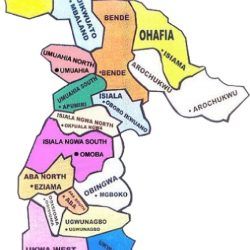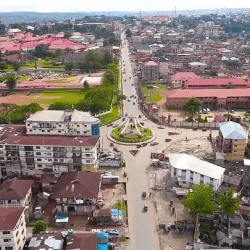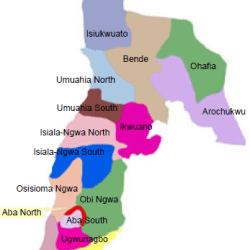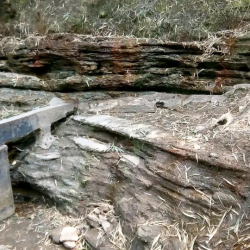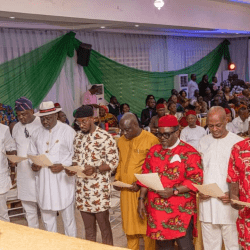1. Introduction to Osusu
Osusu, located within Eziama, is a vibrant community in Abia State, Nigeria. Nestled in the southeastern part of the country, this area is known for its rich history, deep-rooted culture, and economic activities that reflect the traditional Igbo way of life. Geographically, it forms part of the larger Aba urban landscape, yet retains its distinct rural charm and identity.
The community of Osusu is predominantly agrarian, with a focus on communal life, shared values, and a cohesive social structure. Its strategic location within Eziama offers easy access to larger urban centers such as Aba, facilitating economic exchange while maintaining a serene, less congested environment.
2. Historical Background of Osusu
Osusu’s history stretches back centuries, with its origins deeply intertwined with the history of the Igbo people. The community began as a small settlement that grew as clans and families established their roots in the fertile lands of Abia State. Oral traditions recount stories of early settlers who migrated from various parts of what is today southeastern Nigeria, attracted by the area’s abundant natural resources and strategic location.
The growth of Osusu was influenced by regional trade routes, and over time, the community evolved into a hub for small-scale commerce and agriculture. Despite the challenges of colonization and the Nigerian Civil War, Osusu has managed to retain its cultural identity while adapting to modern changes.

3. Demographics of Osusu, Eziama
Osusu is a closely-knit community with a population that reflects the broader demographic trends of rural Nigeria. The majority of the population belongs to the Igbo ethnic group, with a strong adherence to traditional customs and values. The community is multi-generational, with a balanced mix of children, youth, and the elderly, all playing significant roles in the society.
Population data indicates that Osusu has experienced modest growth over the years, driven by natural population increases rather than migration. The people of Osusu are known for their communal spirit, with extended families often living in compounds and participating in joint economic activities.
4. Geography and Climate
Osusu is characterized by its lush, fertile land and undulating topography. The terrain supports various forms of agriculture, making it ideal for the cultivation of crops like cassava, yams, and vegetables. The area is also dotted with small streams and rivers, which have historically been important for both irrigation and domestic use.
The climate of Osusu falls under the tropical rainforest category, with two distinct seasons: the wet season, which lasts from March to October, and the dry season, from November to February. Rainfall is abundant during the wet season, which supports the farming activities that are central to the local economy. The dry season, though less rainy, still sustains a humid environment, making the area conducive for year-round agricultural production.
5. Traditional Governance and Leadership
In Osusu, traditional leadership plays an integral role in maintaining the social fabric of the community. At the helm is the traditional ruler, often referred to as the Eze, who serves as both a spiritual and administrative leader. The Eze presides over local disputes, leads in cultural celebrations, and acts as a liaison between the community and external entities, including the state government.
Traditional councils, made up of elders and titleholders, work alongside the Eze in governing the community. These councils handle matters related to land ownership, marriage, and community festivals. The respect for traditional authority remains strong in Osusu, even as modern political structures have been introduced.
6. Economic Activities in Osusu
Agriculture is the bedrock of Osusu’s economy. The community engages in the cultivation of staple crops such as yams, cassava, maize, and various vegetables. Farming practices here are largely subsistence-based, though there has been an increase in small-scale commercial farming in recent years.
Beyond agriculture, Osusu is home to several small and medium enterprises (SMEs). These include tailoring, craftsmanship, and trading, which are essential to the livelihood of many families. The proximity to Aba, a major commercial city, means that many residents also participate in trading activities, commuting between the two areas.
7. Education in Osusu, Eziama
Education is a priority for the people of Osusu, though challenges such as inadequate infrastructure and teaching staff persist. The community is served by a number of primary and secondary schools, both government-funded and privately owned. While literacy rates are gradually improving, there is still a need for investment in educational resources to ensure that all children in Osusu have access to quality education.
In recent years, there has been a growing awareness of the importance of education, particularly in bridging the gap between rural and urban communities. Families in Osusu increasingly prioritize sending their children to school, with many aspiring to higher education in nearby Aba or other urban centers.
8. Culture and Festivals in Osusu
Osusu boasts a rich cultural heritage, with traditions that have been passed down through generations. One of the most notable aspects of Osusu culture is its vibrant festival calendar. The community celebrates numerous festivals that highlight its agricultural roots, religious beliefs, and historical achievements.
Among these festivals, the New Yam Festival stands out as a major event. This annual celebration marks the harvest of yams, a staple crop, and is a time for thanksgiving, feasting, and cultural performances. The festival serves as a reminder of the community’s deep connection to the land and its agricultural heritage.
9. Religious Beliefs in Osusu
Religion plays a central role in the daily lives of Osusu’s inhabitants. The community practices a blend of Christianity and traditional religious beliefs. Christianity, particularly Catholicism and various Protestant denominations, has a strong presence, with churches serving as important centers for worship, education, and social gatherings.
Traditional religious practices, however, continue to coexist with Christianity. These practices often involve the veneration of ancestors and the observance of rituals aimed at seeking blessings from deities. This fusion of beliefs reflects the community’s ability to adapt to modern religious practices while preserving aspects of its indigenous spirituality.
10. Infrastructure and Development
Osusu, like many rural communities in Nigeria, faces significant challenges in terms of infrastructure development. While the main roads connecting Osusu to Aba and other parts of Eziama are relatively well-maintained, many internal roads within the community are unpaved and become difficult to navigate during the rainy season.
Healthcare facilities are limited, with the nearest fully equipped hospital located in Aba. However, there are local clinics that provide basic medical services to the community. Efforts to improve infrastructure are ongoing, with state and local government initiatives aimed at improving road networks, electricity, and water supply.
11. Notable Personalities from Osusu, Eziama
Over the years, Osusu has produced several notable personalities who have made significant contributions to various fields. These individuals, many of whom have gained prominence in politics, business, and academia, serve as role models for the younger generation. Some have returned to the community to invest in education, healthcare, and other developmental projects.
One of the most prominent figures from Osusu is a well-known politician who has represented the community at both the state and national levels. Others include successful entrepreneurs who have established businesses in Aba and beyond, contributing to the economic development of the region.

